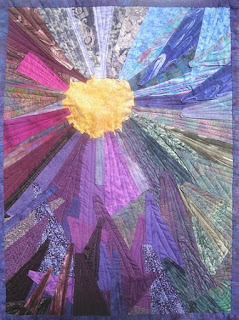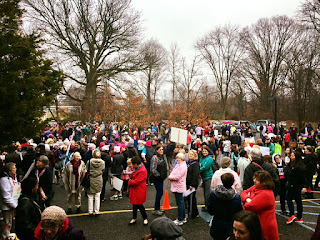Trust me
New Ark United Church of Christ, Newark, DE
January 22, 2017
 |
| Calling Disciples, He Qi |
But we are hard-wired for caution and fear, and with good reason. These innate characteristics have saved human beings from becoming the next meal of a grizzly bear or African lion all the way to keeping us from making friends with every person on the street. Caution and fear are what keep us alive some days. They wise us up, wake us up, saving us in our foolish and reckless youth to living to be older and levelheaded adults.
In this morning’s gospel lesson, we see Jesus’ first disciples behaving as though they are unconditionally trusting. They ask no questions. Jesus does not say by what authority or training they will be doing this ‘fishing for people’. Thus far he hasn’t preached any sermons, healed any people, or performed any kind of miracle. Yet Peter and Andrew, James and John immediately leave their nets and boats, their families and community, the way of life they’ve always known—all to follow Jesus. What would induce them to trust this unknown and as yet, untested rabbi?
The author of Matthew himself gives Jesus some geographical credentials by quoting from the prophet Isaiah: “He left Nazareth and made his home in Capernaum by the sea, in the territory of Zebulun and Naphtali, so that what had been spoken through the prophet Isaiah might be fulfilled: “Land of Zebulun, land of Naphtali, on the road by the sea, across the Jordan, Galilee of the Gentiles— the people who sat in darkness have seen a great light, and for those who sat in the region and shadow of death light has dawned.”
The territories of Zebulun and Naphtali, two of the lost tribes of Israel, to listeners in both Isaiah’s time and in Jesus’ would be like us hearing about places like Aleppo, Mosul, the Sudan—places where war and violence have made a living hell for those who live there.
So when Jesus moves into this neighborhood, he is saying in no uncertain terms that he has come for the lost, for those who live in the shadow of death, for those who have been forgotten. Jesus and his disciples would not be fishing for converts but for those the world has left behind. They would be doing God’s work of gathering in those still in exile: the poor, the outcast, those considered unclean. Jesus was declaring not with words but with his actions that he was ready to do messiah work. For this reason, these first few disciples trusted Jesus with their lives. They introduced a different kind of community that embraced the most unlikely folks to succeed, setting up shop in a place not to be trusted.
Jesus takes his message and his disciples to those who need him the most. He goes where they are. He does not wait for them to come to him, though many do. Jesus is more interested in closing the gap, making a connection with those who feel disconnected from God and from community.
We need to figure out how we’re going to do messiah work: to seek out the lost, to go where they are, those who live in the shadow of death, those who have been forgotten. Where are the territories of Zebulun and Naphtali—neighborhoods where people’s lives have been ruined by war and violence? And I when say ‘war and violence’, let us remember that poverty is a form of violence, that addiction is a form of war. Those who depend on Obamacare and Medicare and Medicaid now have a keener sense of that shadow of death on their heels. Our public education system may be lost to Betsy DeVos who doesn’t seem to have a clue that all schools that receive public federal funds, whether public, charter, or private, should be held to equal accountability. And though it may have been, as Mr. Trump said in his inauguration speech, the forgotten men and women of this country who elected him, I think we can count on that it won’t be long when they will be forgotten by him.
In my remarks yesterday I wondered if we would’ve marched if someone else had been inaugurated yesterday, because the same problems would still be here. It’s likely we would’ve felt safer, our rights protected. We would’ve been happy to witness that shattered glass ceiling. We would’ve felt relieved, as with a narrow brush with disaster. Maybe, after the inauguration, we would’ve returned to our lives and just been disgusted with the news of sexism and obstruction in Washington. Would we have been as fierce and fired up and awake as we are now? Would we be as ready to work and for the long haul? Would we have known how deep the wounds in our nation go?
It’s time for us to trust where Jesus is leading us, which is right into the darkness, to those who are waiting for that great light. Rebecca Solnit, author of Hope in the Dark, writes that the future is dark in that it is inscrutable, unknowable. She says that this is a good thing because it makes space for creative intervention. And we could use a lot of creative intervention right now.
Yesterday we were fierce, fired up, awake, as if we had seen a star in the east and followed where it led; as if we had witnessed the salvation of our people; as if we had heard a heavenly angel army sing of God’s blessing and goodwill to all nations. Today, and every day forward, the work of Christmas is begun. And we need to be ready to do that work.
 |
| "Follow me, and I will teach you how to fish for people." |
A friend of mine observed that in his inauguration speech, Mr. Trump used words like great, first, only. Jesus is more along the lines of lowest, last, and many. I think we know who we can trust. The question is, are we ready to leave our nets, the way we’ve always done it, and fish for people the way Jesus does and go where Jesus goes? Are we ready to really dig in and do messiah work?
Amen.




Comments
Post a Comment